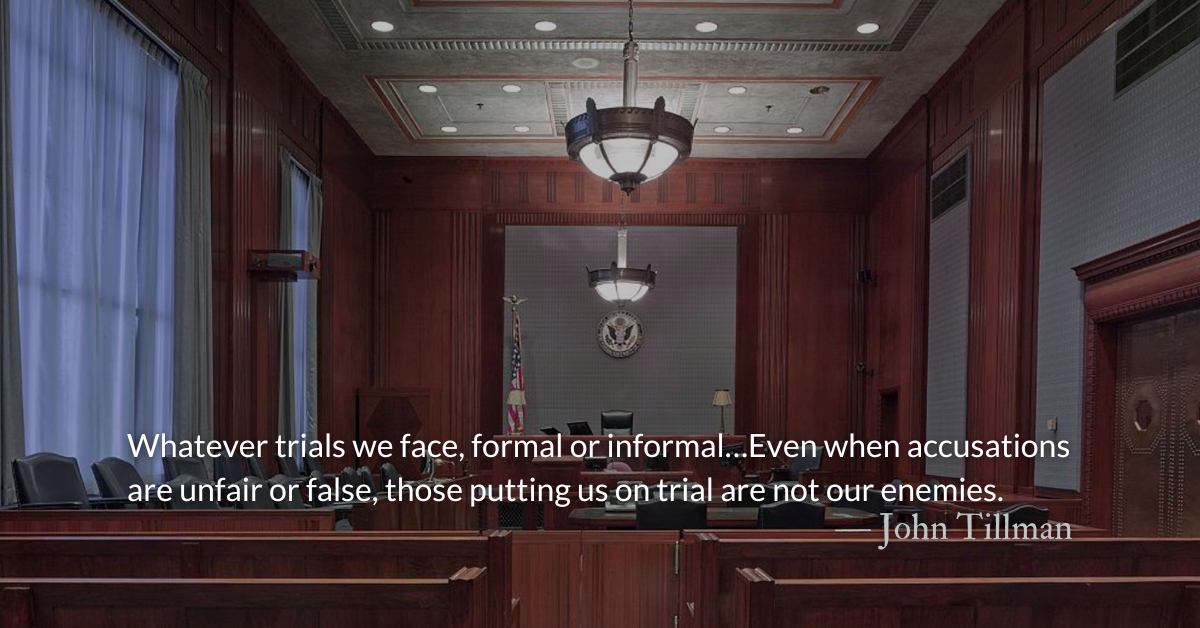Scripture Focus: Acts 24.14-16
14 However, I admit that I worship the God of our ancestors as a follower of the Way, which they call a sect. I believe everything that is in accordance with the Law and that is written in the Prophets, 15 and I have the same hope in God as these men themselves have, that there will be a resurrection of both the righteous and the wicked. 16 So I strive always to keep my conscience clear before God and man.
Reflection: Winning People > Winning Arguments
By John Tillman
Acts gives many examples of followers of “The Way” on trial. When we are on trial, in courts or in conversations, do we follow their examples?
In every case, those who were handed over to the local councils, flogged in the synagogues, or brought before governors and kings served as witnesses about Jesus both to their accusers and to the authorities they stood before. This is as Jesus said it would be. (Matthew 10.16-20) They were sheep among wolves. They were as wise as the snakes that accused them and yet as innocent as doves. Jesus said that when they were put on trial the Holy Spirit would speak through them.
Paul is on trial for his life and, in a sense, his faith. His accusers charged him with blasphemy, yet Paul was the one confessing the true God. Their denial of Christ was blasphemy against the Holy Spirit. Paul was accused of rebellion, yet it was they who crucified the rightful King. Their execution of Jesus was a rebellion against the only kingdom that matters.
Inspired by the Spirit, how does Paul respond? Does he spit fire, pronounce curses, and call them blasphemers and heretics? No.
Paul defends himself against lies but he doesn’t need insults to do it. He simply tells the truth. Not only does he not insult them, Paul emphasizes his common ground with his accusers. “I have the same hope in God as these men,” Paul says.
We have little control over what courts or kings may judge us or demand an account from us. On social media or in conversation, there are many judgments or arguments we might face.
Unlike Paul, we may face accusations that are true. “The church abused me.” “The Bible was used to harm me.” Even if, individually, we are innocent, rather than being defensive, we should address these with compassion and humility. We should heal, not deny, people’s wounds.
Paul’s trial was a platform for him to find common ground with all people and to explain the gospel publically. (Acts 26.28-29) Whatever trials we face, formal or informal, keep Jesus’ words and Paul’s example front of mind. Even when accusations are unfair or false, those putting us on trial are not our enemies. We aren’t there to win the trial or win the argument but to win people for the gospel and bring honor to Jesus.
Divine Hours Prayer: A Reading
Jesus said to us: “…Everything now covered up will be uncovered, and everything now hidden will be made clear. What I say in the dark, tell in the daylight; what you hear in whispers, proclaim from the housetops.” — Matthew 10.26-27
– From The Divine Hours: Prayers for Springtime by Phyllis Tickle.
Today’s Reading
Numbers 1 (Listen 6:21)
Acts 24 (Listen 4:11)
Read more about Portrait Shaped by Scripture
If we can show the beauty of living in a way that shows the Father’s love, people will be willing to consider trusting our Father’s words.
Read more about None Excluded or Excused
Are you one of those sharing the gospel? Who are you bringing along? Who are you collaborating with? Who is learning from you and from whom are you learning?







